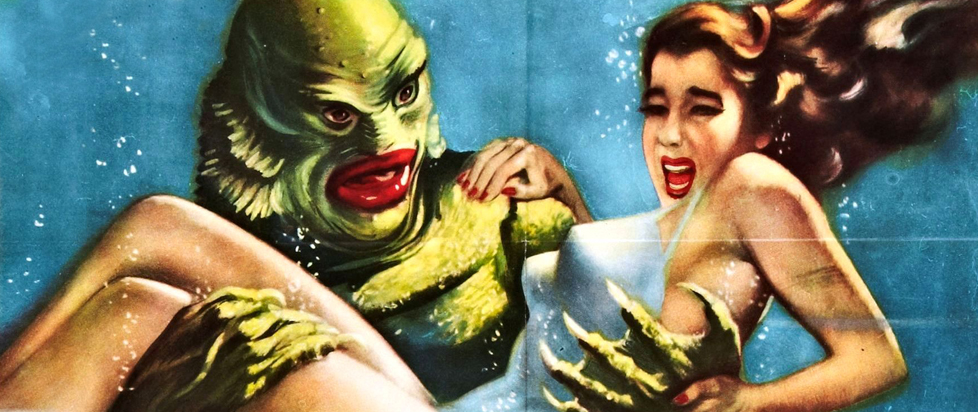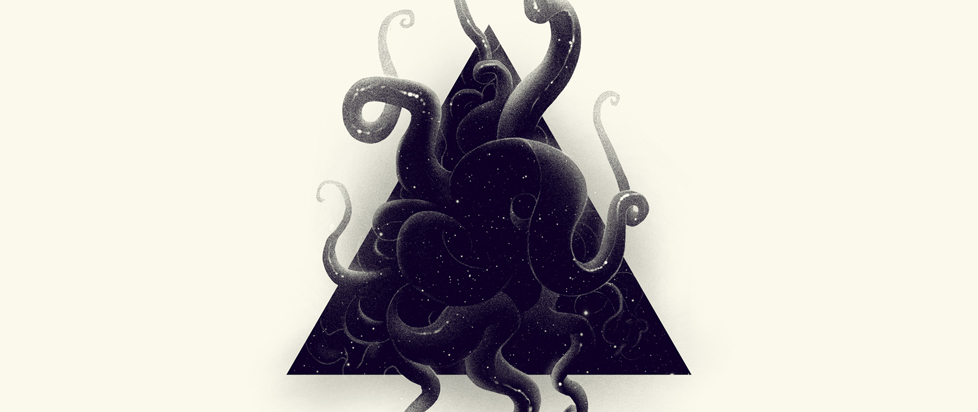
Summer Reading
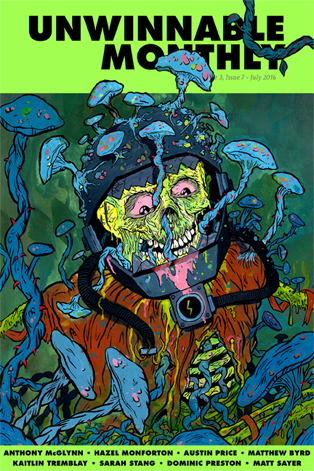
The Burnt Offering is where Stu Horvath thinks too much in public so he can live a quieter life in private.
———
This is a reprint of the letter from the editor in Unwinnable Monthly Issue Eighty-One, the Body Horror issue. You can buy Issue Eighty-One now, or purchase a one-month subscription to make sure you never miss an issue!
———
This year is turning into a banner one for horror novels, which is strange, because horror novels tend to not be very good at scaring people.
Yeah, yeah, you love Stephen King, I know, but hear me out.
When Edgar Allen Poe reviewed Nathaniel Hawthorne’s collection Twice-Told Tales (one of those moments in history that always seemed to me like a kind of cosmic fan fiction, like Nikola Telsa and Mark Twain being friends), he laid out his ideas about the short story, a bit of literary theory that gets drilled into every high school student’s head. Namely, that the point of the short story is “unity of effect.” Every word the writer chooses must contribute to the delivery of a preconceived emotional payload. Poe believed the short story is the perfect literary form primarily because the constraint of its length forces writers to be concise. In other words, there’s no room for bullshit.
This makes short stories a particularly effective form for horror, a fact Poe proved many times. The feelings we seek out in horror – dread, disquiet, the numinous – are fleeting sensations. The longer such things confront us, the more we acclimate. No matter how dark the terror, the dawn eventually drives it away. (This is probably built directly in to our DNA – the early humans who could shake off fear to act decisively probably had a better survival rate than those ruled by fear.)
Therefore, the horror short story functions as a surgical strike, punching through our built-up tolerance and making its impact before the unease dissipates from exposure.
Taking both his thoughts on the short story and his body of work, Poe makes a case that horror is at its best at under 7,500 words. This lines up with my personal experience – my favorite horror stories are all short.
Horror novels tend to disappoint because a story can’t stay tightly coiled over the course of 300 pages. This is a function of medium – novels aren’t built for scares, the same way TV shows aren’t built for subtlety and movies struggle with intricate plots. They’re long, usually requiring several sittings. They meander. They digress. That’s why I love novels – they have all that extra headroom – but fear dissipates in there, like an apartment air conditioner trying to cool off a warehouse.
That’s why these novels (and one novella) are so surprising: they manage to cool the warehouse. You should read them right now so we can talk about them.
(A brief note: I am friendly with most of the writers I discuss here, which means if they write something I don’t like, in turn, I am probably not going to write about how much it sucks. But then, I don’t often bother writing about things I think suck anyway. If you think this is biased, fair enough.)
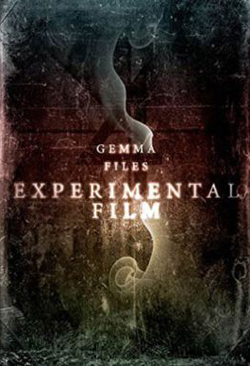 Experimental Film, by Gemma Files
Experimental Film, by Gemma Files
Experimental Film is a miracle of structure. It is a novel written by a former film historian with a son who is on the autism spectrum, about a former film historian whose son is on the autism spectrum who discovers an early Canadian film pioneer whose son was on the autism spectrum. It involves a supernatural entity that comes with the glaring heat of the noonday sun, that is obsessed with mirrors, that can strike a person blind, that desires to be seen. What a perfect mix of themes for a novel about film and self-reflection, no? Ultimately, Files’ real life experiences give the proceedings a powerfully frank emotional weight that forms up the core of the novel. More than anything, the protagonist struggles with her role as a mother – the specter that haunts her is very much her maternal fears and inadequacies given deadly form. Experimental Film is an elaborate machine constructed to instill within the reader those complicated emotions.
Recommended for: film buffs, parents, Canadians
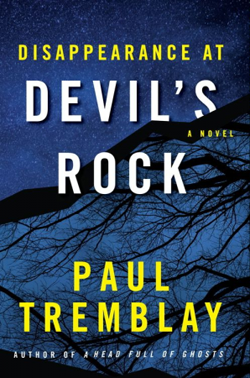 Disappearance at Devil’s Rock, by Paul Tremblay
Disappearance at Devil’s Rock, by Paul Tremblay
Tremblay is a writer preoccupied with the aftermaths of traumatic events. Disappearance at Devil’s Rock examines the effects of a teenage boy’s strange disappearance on his mother, his sister, his friends and his community. While those effects are sometimes harrowing and play on paternal fears – where is my kid and what kind of trouble is he getting into? – the real heart of the book is exhaustion. Worry, tears, lack of sleep, alcohol, people’s concern – you name it, it wears down these characters. Sometimes they are zombie-like. Sometimes they get bursts of manic energy. Always, they weigh their perceived lack of action against the fact that there is nothing to do but wait. It’s gut-wrenching stuff, rooted in uncertainty – not just for the stories central mystery, but for the true, secret lives of our loved ones.
Recommended for: parents who live near woods, people who thought Stranger Things wasn’t depressing enough
 The Ballad of Black Tom, by Victor Lavalle
The Ballad of Black Tom, by Victor Lavalle
The novella The Ballad of Black Tom is a retelling of H. P. Lovecraft’s story “The Horror at Red Hook” – arguably his most repellently racist piece of fiction – from the perspective of a black man (both the protagonist, and Lavalle himself). In many ways, it is a reclamation, a way for Lavalle to square his love of Lovecraft’s work with Lovecraft’s racism. He takes themes used by Lovecraft – cosmic meaninglessness, helplessness, the incomprehensible – and repurposes them. The vast monster here isn’t some creature under the ocean, it is a cop, a rich white man, the looks you get on a train going through a white neighborhood. Through cosmic horror, Lavalle conveys something like the experience of living in a racist society. It hits with the same sick, angry despair that came with Ferguson, which comes with every news story about black people being shot, beaten or otherwise mistreated by police.
Recommended for: Anyone who says “Yea, but…” when someone points out that Lovecraft was a virulent racist
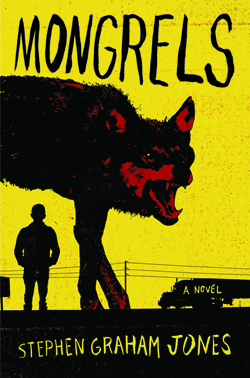 Mongrels, by Stephen Graham Jones
Mongrels, by Stephen Graham Jones
Mongrels is about a lot of things – life as an outsider, poverty, shitty cars. It is also about werewolves. Mongrels is the best werewolf novel I have read. Jones re-imagines the mythology so casually and so brilliantly, it is borderline infuriating (see Jone’s explanation for why werewolves don’t wear pantyhose or spandex). The unnamed narrator is a boy in the care of his aunt and uncle, who happen to be werewolves. He might be a werewolf, too, but there’s no way to know until his first transformation in his teens. Told as an episodic travelogue (werewolves don’t stay in one place too long), the novel is a coming of age story and an oral history of werewolf lore. The boy collects stories – his aunt and uncle’s, his late grandfather’s, the ones he makes up himself – and there’s no telling what’s true and what’s bullshit. Which, come to think of it, is the very definition of growing up.
Recommended for: werewolf fans, anyone who was an awkward teenager
 The Fisherman, by John Langan
The Fisherman, by John Langan
I don’t honestly know where to start with The Fisherman. I had no expectations going in, other than I enjoy Langan’s short work and had trouble with his previous novel. I wound up reading The Fisherman essentially in a single sitting – I couldn’t stop because it felt as though it was literally being told to me by the narrator. It is the tale of a particular fishing creek in upstate New York, how it came to be and of the strange things that happen there. The book slips effortlessly from the mundane to the staggeringly cosmic. Perhaps most surprising is that Langan deals with his supernatural elements with a matter-of-factness that ends up being far more disturbing than hiding behind exhortations of indescribability. I am loathe to say more, except that The Fisherman is one of the most compelling books I’ve read in several years.
Recommended for: fishermen, naturally
* * *
There. Now you have the rest of your summer reading. Well, after you read the rest of this month’s issue!
The theme this month is body horror, so don’t read it while eating your lunch. We’re still releasing a bit later in the month than I’d like, but we’re back to full strength with the return of Bestiary, Throwing the First Brick and Unsolvable.
That’s it. See you in August!
Stu Horvath
Jersey City, New Jersey
July 28, 2016

